Content
SEO for Dentists – A Guide to Dental SEO
In today’s times, digital marketing is all the rage. And alongside digital marketing comes a whole slew of other related items like search engine optimization (SEO), which further amplifies the already impressive capabilities of digital marketing. As such, for today’s dentist who is in tune with the times we live in, SEO is crucial.
SEO for dentists is something that has a track record of success, and in this passage, we’ll run you through some of the best dentist SEO tips that you can get to further increase your business. Dental SEO, lets get started on some of the basics right here.
But hold up, you might ask yourself, where did conventional marketing go? Is dentist SEO marketing really all that useful, and will it actually help pull patients towards the dental establishment?
If so, what is the best SEO strategy for dentists, if such a thing does exist? Well, for starters, yes, SEO for dentists is a really lucrative proposition, considering that SEO objectively increases the number of organic leads you can capture off the internet.
And that’s not all; aside from the usual marketing proficiency that SEO has, you also benefit from other strategies like word-of-mouth and other related concepts.
So, lets delve deeper into these questions, and answer each one of them in a manner that it removes any semblance of confusion and convinces you that SEO for dentists is the next best thing since the toothpaste that all 10 dentists do actually recommend, if such a thing really exists. If it doesn’t, SEO is here to save the day.
Let’s get into it…
What is SEO for Dentists?
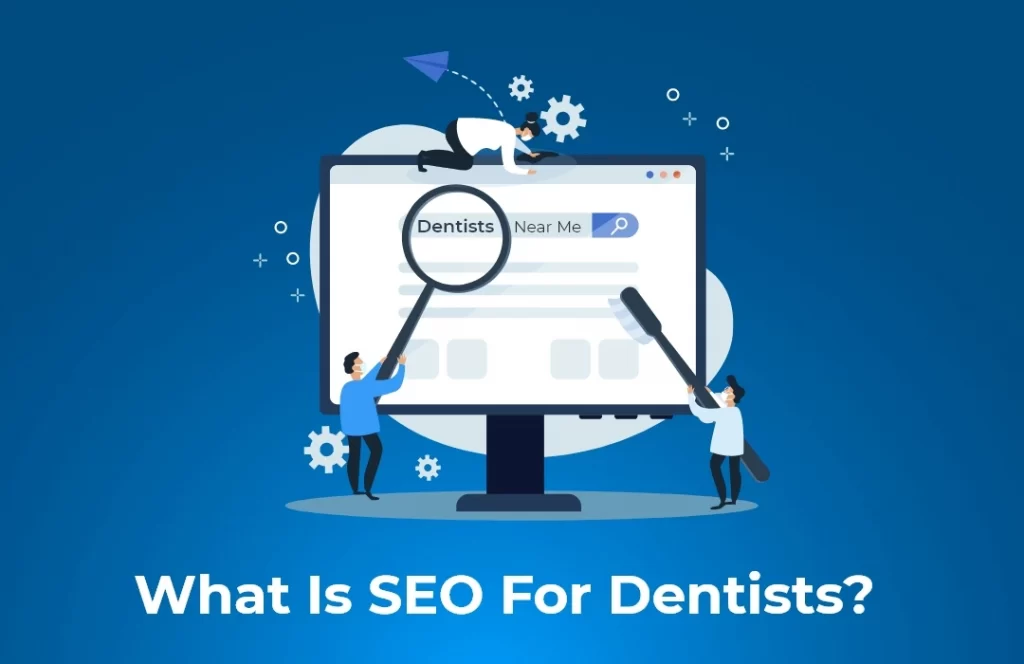
So, the concept is pretty clear. SEO basically increases the reach and exposure of your website; now simply apply this concept on a dentist’s business.
Considering that every business, no matter how small or catering to a conservative crowd, has a website nowadays, SEO is the only logical way that you can go about making it beneficial and pull leads off of your dentist website.
SEO for dentists is essentially the best SEO practices that will take your dentist website to the next level, take it higher in the SERPs (search engine result pages) and overall, be a positive attribute for your website.
Let’s understand it this way: imagine a person has a sudden sharp flare of pain in their tooth while on their phone.
What’s their next logical step? Googling pain remedies, right? Well, this is where dentist SEO comes in.
You see, when a person searches for pain remedies for toothache, your website, if its has had its SEO done properly, will show up on the top.
The person is more likely to click on it, and will become a business lead. They schedule an appointment for a dental check-up, while you dispense some quick pain relief advice, and all is good in the world.
This is how SEO for dentists works. Apply the principles of digital marketing and SEO on a dentist website and you have got a way to pull in more customers from the internet.
But the important part here is that SEO works only when it is done properly; hand your SEO tasks over to a hack and you will have just an empty hole on the internet that would go nowhere.
Why SEO for Dentists is Important?
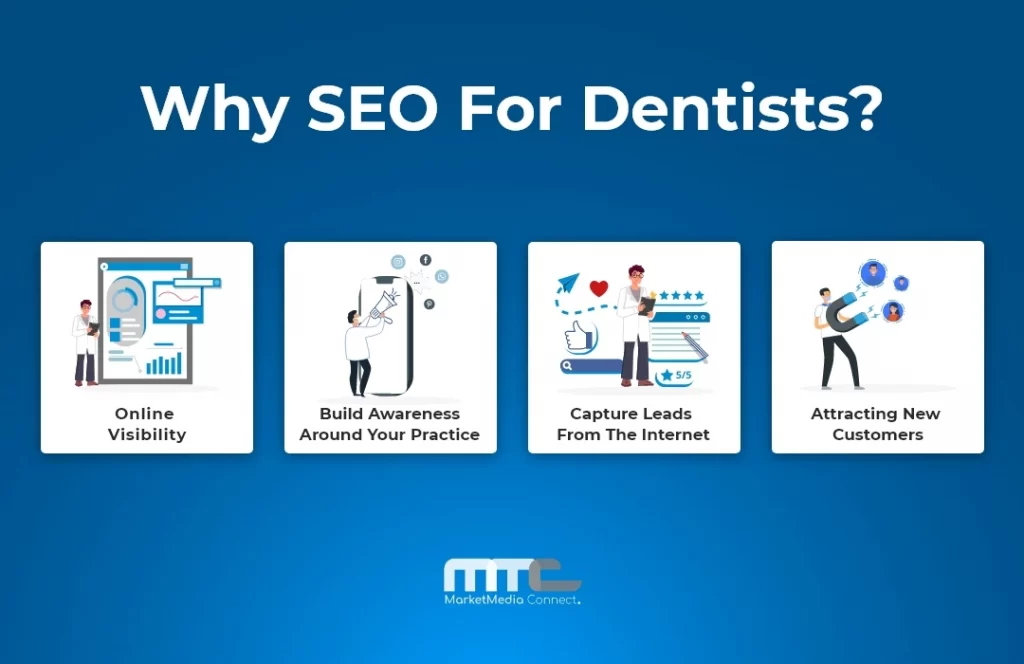
As explained beforehand, SEO for dentists is the go-to marketing advice in this digital era. Gone are the days of getting an advert out in the paper or taking up time in the local television or radio slot.
Dental Digital marketing is more focused, more cost-efficient and gets better results than conventional marketing. And on platforms like Google, you’re bound to get a lot of conversions that will eventually land you some serious business.
Let’s take a look at some of the reasons as to why SEO for dentists is such a lucrative deal.
- Online Visibility: So the big one here is online visibility, which is primarily why you would get SEO for dentists. SEO helps you increase your visibility on online platforms, including Google, Facebook and other online platforms. This helps you gain new business leads, as people will interact online with your adverts and respond positively towards it.
- Build Awareness Around Your Practice: The second reason for why SEO for dentists is that it allows you to build an awareness around your dental practice on the digital forums, where people are more likely to interact with it en masse. This is because, the more awareness you have among the people about your dental practice, the more likely they are to contact you or reach you out for services should they have the need for it.
- Capture Leads From the Internet: The primary motive for dental SEO is this one: capturing potential business leads from the internet, thereby allowing you to grow your business exponentially and get a good return on investment (ROI) from your SEO marketing strategy. This is important, since marketing is all about getting new business, and touching base with the existing customer base, and digital marketing does just that for a fraction of what you would end up shelling out money for conventional marketing.
- Attracting New Customers: Building from our previous point, SEO will also help you capture new business, attract new customers as they search on the internet for a good dentist and find you there, thanks to your good SEO strategy, which allows for your website to pop up at the top whenever somebody searches for ‘dentists near me that can get me out of my hellish pain’. We’re just kidding about the search term, but you get the idea.
Dental SEO: The Things to Keep in Mind
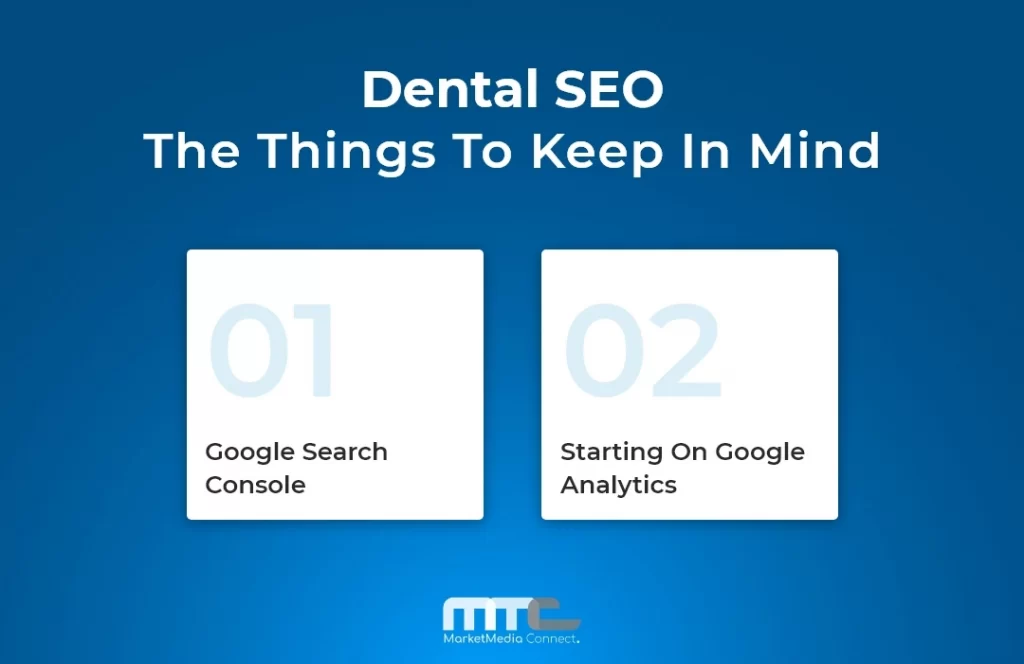
There are many things that you need to keep in mind when discussing dental search engine optimization, which pertain to things that you should know and do, and things that you should actively avoid when discussing about dentist SEO marketing.
1. Google Search Console
Prior to starting on your dental SEO, you will need to have set up your Google Search Console, as it is one of those massively helpful tools without which your SEO strategy might as well be a non-existent thing. So, for starters,
- You will need to sign in with a Google account, preferably one made specifically for your dental business, although personal is fine too.
- Then, add a property, which is essentially a domain or a URL with which Google will identify that it is a business entity.
- After that, Google will send you a verification email or message.
- The last step will have you submitting a sitemap for your dental website, which will complete your Google Search Console process.
Your business is now not only registered with Google, but the search giant will now actively track your business indexes and metrics and display it all on the dashboard.
2. Starting on Google Analytics
Another thing that you need to keep in mind is Google Analytics, which is part of an entire suite of services provided by Google to ensure that monitoring your business metrics is an absolute breeze. The process is very much similar to what we did with the Google Search Console;
- You start by signing in with your account and setting up your property;
- This will lead you to the business information section, where you will input all the particulars about your business, like numbers, emails, locations, addresses and currencies that you accept.
- After that, just generate your tracking ID and you’re all set!
These are the two steps that you need to take prior to getting started on the dental SEO plan; these steps will ensure that you have a monitoring platform with Google where you can have all the metrics and aspects under one roof.
Ranking at the Top on SERPs for Dentists
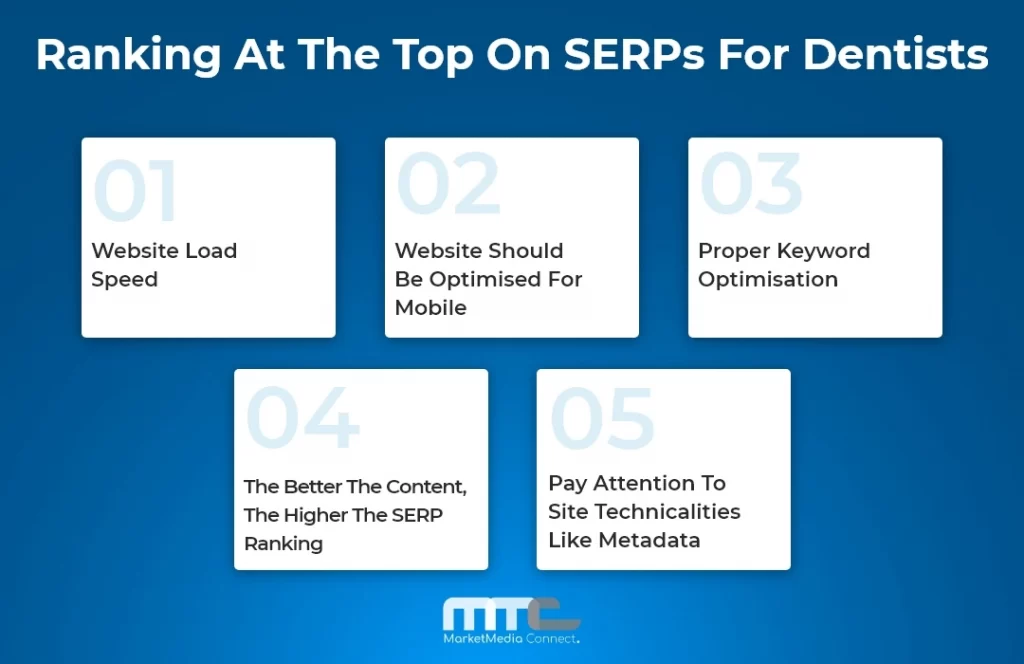
A pivotal part of the entire SEO process is the fact that your dental services website needs to come out on the top of SERPs, which are the search engine result pages, where most people click on links to access the websites.
This is the make-or-break part; if you are within the top five, your website is more likely to be accessed, and if people like what they see, they will continue their business with you.
Therefore, ranking high on the SERPs is very crucial. Here, let us guide you through this entire process of getting to the top of the SERP food chain.
1. Website Load Speed
A good point to start from for ranking your website higher on the SERPs. If your website takes forever to load, you can almost be certain that your website is getting all the hate from the users and Google.
However, if your website is fast-loading and does so in a second or two, people will stay on it. That’s how you stay on the top, and that’s what you should do to get to the top.
2. Website Should be Optimized for Mobile
As more and more people start their searches from their mobiles and NOT their laptops or computers, you should also stay in tune with the times and optimize your website for mobile applications or browsers.
That is because, if a website not optimized for mobile is accessed from a mobile, which is more likely, the resulting UI will be all mixed up, prompting the user to just up and leave. And this messes up SERP standing more than anything.
3. Proper Keyword Optimization
The next thing to keep in mind to dominate the SERPs? Keyword optimization that targets the right keywords will go a long way towards making your SERPs ranking better and better.
Therefore, keyword research is a must and should be done targeting the right keywords, so that your website can be ranked higher and higher on the SERPs.
4. The Better the Content, The Higher the SERP Ranking
Content is king, and this king can help you get to the top of Google’s search page. How so?
Well, if you have content that people will actually read and not just glance over and click on that doomed ‘x’, it will help glue the user to your website, increasing your dwell time, which is how long a user stays on the website.
Dwell time can seriously affect your SERP ranking, and if you want to rank higher, your content needs to not just be impeccable, but something that glues the user to the screen, short of you know, the PG-18+ stuff.
5. Pay Attention to Site Technicalities Like Metadata
Site metadata, offsite and onsite link structure and social signals are all website technicalities that you might think do not matter all that much, but you would be surprised to know how much sway they have over the SERP rankings.
Especially website metadata, which needs to be correct and impeccable, as Google uses it to rank your website on its result pages. Similarly, offsite and onsite link structure also needs to be taken care of, and needs to be A-Okay, along with social signals. That you cannot just ignore.
So, make sure you’ve covered all these bases, and then watch as your website comes out on top against even a simple search like dentists near me or other incredibly vague search terms, where your website might be potentially contending with millions of other websites and even more webpages and search queries.
Types of Keywords for Dental Website SEO
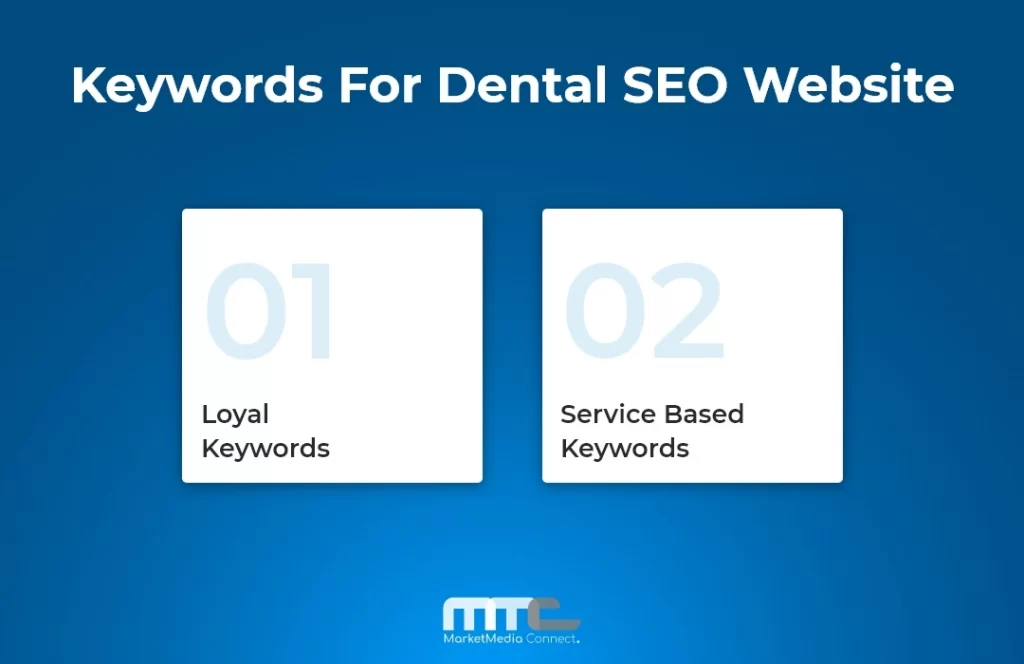
Keywords are the basic building blocks of any good SEO strategy, and the more effective you want your SEO strategy to be, the more effective your keywords research and subsequently your keywords themselves need to be.
To that end, keyword research needs to be done in a way that the keywords that are gathered from there are relevant, have a lot of traffic and can be integrated easily into the content types that you want.
Let’s take a look at what dentist SEO keywords you need to have, and we’ll also let you in on some keywords that are a sure-fire way to kickstart your SEO for dental websites.
Choosing the right keywords for your dental SEO website is imperative. For those, we have two types of keywords that you should look into: one is of the local persuasion or location-based, while the second one relates more to the industry itself, or to the service.
Let’s look at these two keyword types a little more and work on how you should integrate them into your dental SERP marketing.
1. Local keywords (Based on Locale):
The first keyword type that will definitely benefit your dental keywords strategy are the local keywords or keywords that are tied with a specific locale according to the user.
Considering that whenever you search for a dentist, there is a good chance that you have a toothache or another dental problem, and you want a service that’s closest to you.
Crossing state lines while pressing your cheek and grinding your teeth isn’t something that is common, therefore, the first keyword type is local keywords.
Now, for local keywords, you might get an idea for using your locale, and that’s a good idea. If you have offices located in Miami, FL, you can always bet on ‘dentists in Miami’ or ‘dentists in Miami Florida’.
Then there are the vaguer ones; the most popular one being ‘dentist near me’. This is a high-traffic keyword, and considering that everybody in the world from Wellington, New Zealand to Springfield in Chicago is going to search for it, you’re going to have to pass on it.
Instead, you can focus on other variations of said locale-based keywords, like ‘best dental clinic in Miami’, ‘best dentist for toothache in Florida’. You get the idea, right?
2. Service-based keywords:
Second up are the service based keywords, and they too have a lot of traffic on them, and are supposed to be pretty potent as a choice when it comes to keyword researching and dental SEO planning.
Service-based keywords don’t follow a locale or a specific place, but are rather geared towards the industry and any associated concepts in itself.
For instance, a good service-based keyword would be ‘emergency dentist’ or ‘dental implants cost’. These are all keywords that are related to specific industry terms and are not location bound.
However, Google does only show places that are near the user itself (if the location on the search device has been turned on), so, it doesn’t matter all that much.
But still, service-based keywords are in a league of their own, as a person suffering from a toothache would certainly go for a ‘good dentist for toothache’.
More than that, several other keywords can passively act towards boosting your website. For instance, if you have a sure-fire solution to a toothache that gets rid of the pain in minutes, you can post it on your website and optimize it against keywords like ‘quick tooth pain relief’ or ‘quick toothache remedies’ and even ‘toothache solutions at home’.
While these may not necessarily lead the reader to your physical establishment, it will have certainly helped them, and this will eventually pay off. So, look into these as well.
How to Perform SEO for Dental Websites
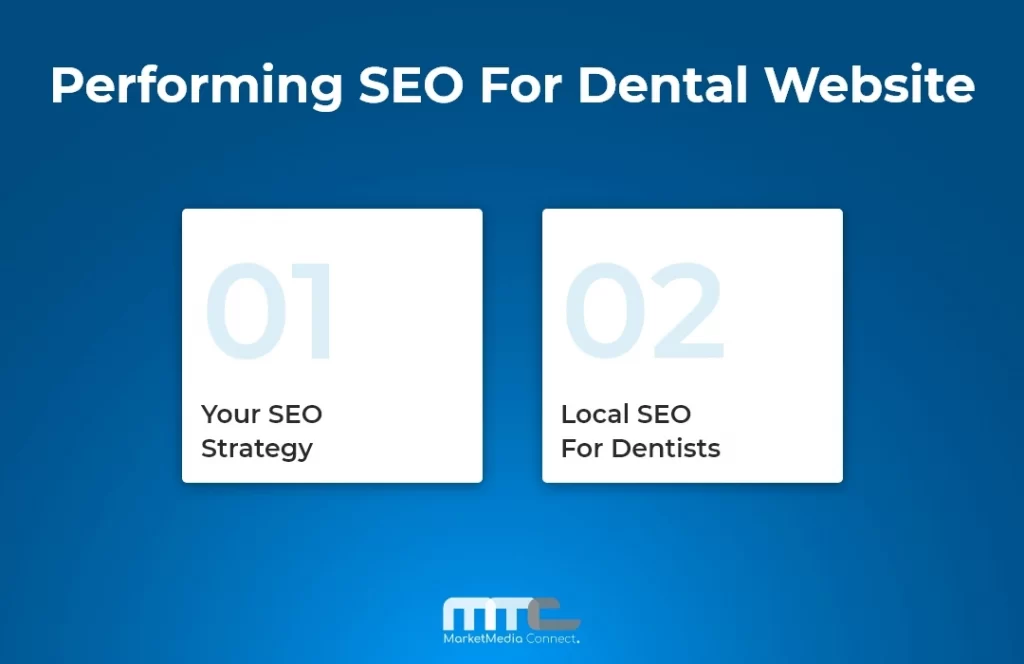
Once all this has been done, now its time for the main event: getting to the actual act.
Performing SEO for dental websites, wherein the implementation of your SEO strategy will matter the most.
Therefore, an SEO strategy will be required, which will combine all the things that we have covered so far beforehand.
Each and every step comes together to form a solid SEO strategy that will see your dental website turn out business conversions at a decent rate.
Let’s talk a little bit about your SEO strategy, because that is essentially what drives the entire thing forward, and is what your business conversion rates depend on.
Performing SEO is covered by the steps mentioned beforehand, now let’s talk about the one thing that kickstarts it all.
Your SEO Strategy
Strategy consists of a specific game plan that you use to make sure that a plan works and gets you to the desired goal. Your goal is SEO dominance and using that dominance, dentists want to have increased business leads pour in from the internet.
For that to happen, your strategy needs to be cognizant of the fact that social media is a great indicator and driver of business leads.
Beyond the usual adverts on Google, Facebook, YouTube and elsewhere, you need to engage people and potential customers via engaging posts on different platforms: again, Facebook and Twitter to start off from.
While the rest of your strategy depends on the quality of your content, which dentist SEO keywords you’ve optimized for and how much your website is responsive and user-friendly, social media is a great and pivotal part of it.
The better your strategy, the more likely your website is to pull leads off the internet and start giving you a great return-on-investment (ROI).
Local SEO for Dentists: How it Helps to Grow Your Business?
We’ve talked about how potent locale-based keywords are for your overall SEO strategy.
Now let’s talk about local SEO for dentists, because it takes local dentist services up a whole notch and will certainly allow you to reap more benefits in terms of business conversions and leads.
But first, let’s talk about what local SEO is: it is basically a strategy that accounts for local keywords, and targets a search area based within a specific locale. As such, aside from local keywords, you also need a location-specific search to work on it. Lets talk about it a little bit more.
Dentistry is a business where local SEO is objectively more useful than general SEO. That is because, if we cite the same example as before, we see that any person looking up for a dentist would obviously do so under a certain situation, for example, a toothache or bleeding gums.
In that case, you don’t want the best dentist that’s two or three states away, you want a dentist that is two or three miles away so you can go get that pesky tooth removed or have that toothache problem dealt with for once and all.
Therefore, in that case, local SEO will be more advantageous to your position, where it would show your
establishment as the one nearest to the person, thereby making it likely that the person will visit your brick-and-mortar establishment.
Increase Clients Base With Dental SEO Services
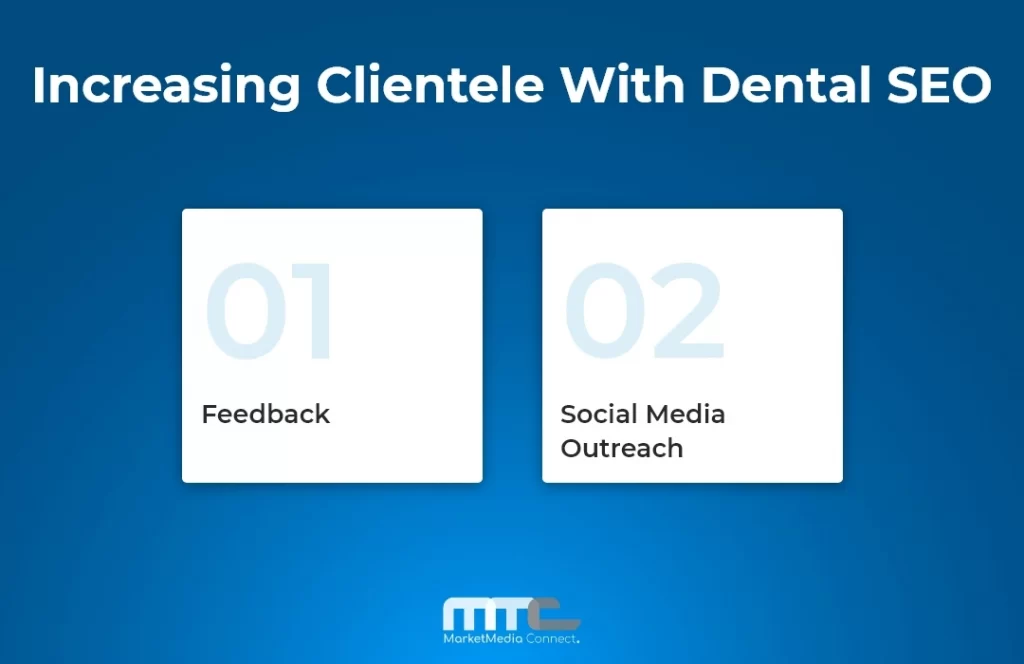
A strategy without a goal isn’t all that good. Before you make a strategy, you make and set a goal that the strategy will then lead towards.
Therefore, your goal with dental SEO for your website ought to be something that is achievable. The primary goal for dental SEO services would be to increasing business leads from the net and increase your clientele.
How can you do so?
- Feedback: Increasing clientele goes beyond just regular SEO practices. One of the suggestions that we’ve heard out and about concerns feedback: much like Yelp!, you can respond to any comments or feedback that is left by a user on Google Maps or elsewhere, thereby giving the notion that you are an establishment that listens and responds to its customer, and are not like what corporatocracy wants you to be. This goes a long way towards not only retaining an existing customer, but any person who searches you out will also see it and will be struck by the positivity of said gesture, opening up new avenues of attracting new clients. This will also help greatly with your dental SEO.
- Social media outreach: Another great way of increasing clientele using SEO is by using social media for outreach, which includes using social media posts to increase engagement with existing customers, with the hopes that these attempts will eventually get to the customers you want to reel in. These customers will be enticed into looking into your dental services after engaging with your presumably interesting social media posts, so this another way of increasing clientele with dental search engine optimization.
To Conclude
In conclusion, dental SEO will work actively towards increasing your digital outreach on social media platforms, from where you will be able to generate a lot of business leads, giving you a good return on investment after you’ve spent some time on your SEO for dentists strategy.
Following the path of local SEO, dutiful keyword research, creating good and engaging content, ticking all the website optimization checkboxes and finally, having an unbeatable SEO strategy will help you get that sweet, sweet business leads.
Dental website SEO will help you pull in customers like its nothing, and that is exactly what makes SEO for dentists such a winner.
FAQs:
Dental SEO works, simply put, much like regular SEO, only its been targeted for your dental website, designed to catch business leads from people looking for dentists within a specific vicinity.
This usually depends on the kind of SEO strategy that you are taking. A more thorough and complex strategy will have you seeing results after the strategy has run its course. For quick results, a concise and simple SEO strategy is usually enough.











